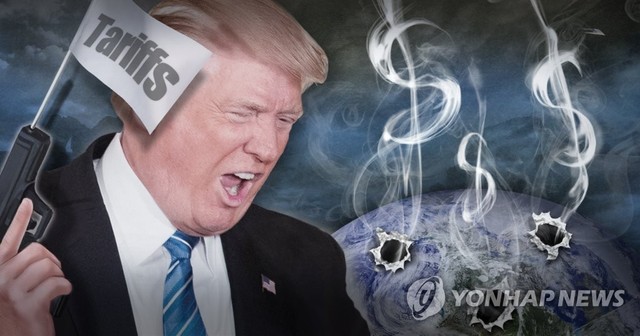Posted on : Jul.7,2018 15:30 KST
 |
|
As many feared, US President Donald Trump has launched a trade war against China.
|
The trade war between the US and China has begun at last. As expected, the Trump administration imposed a steep tariff of 25 percent on 818 Chinese products, taking effect at 12:01 am on July 6. The tariffs are worth US$34 billion. China immediately imposed retaliatory tariffs, declaring that “the US has begun a trade war without historical precedent.” This is deeply discouraging to the international community, which had hoped until the end that a solution could be found through negotiations.
What is even more concerning about the two countries’ trade war is the high likelihood that it will escalate further. The Trump administration originally earmarked US$50 billion for tariffs, and it is threatening to impose tariffs on the remaining US$16 billion within two weeks. If China retaliates, the US government has warned, it will counter by slapping China with even more tariffs. This is taking the shape of a chicken game, with one retaliatory measure begetting another.
The Trump administration has been impetuous in provoking trade conflicts. It is taking aim not only at China but also at countries and regions around the world – including Canada, Mexico and the EU. South Korea is no exception. The items affected seem to be chosen at random. First the US threatened to impose retaliatory sanctions on steel and aluminum, and now it’s automobiles.
Trump thinks that a protectionist approach to trade will increase jobs in the US and reduce the trade deficit, but he is mistaken. A trade war might not only provoke a recession in the global economy but could even backfire on the American economy. When the EU retaliated against the US’s tariffs with tariffs of its own, US motorcycle manufacturer Harley Davidson decided to move some of its production facilities overseas, demonstrating that protectionism could eventually boomerang. Despite all this, Trump refuses to end his trade war, which many analysts believe is aimed at consolidating the white voters who are his base of support for the midterm elections in November. This can only be seen as recklessly holding the global economy hostage to win an election.
This inflicts a direct blow on the South Korean economy, given its high dependence on exports. Since South Korea exports a substantial amount of capital goods and intermediate goods to China, the American sanctions on China have a direct impact on South Korean exports. The government and export companies must work together on all-out countermeasures to minimize the damage. In the mid- to long term, we will have no choice but to increase our product competitiveness and diversify our export market by opening up new markets. There also needs to be consistent policy support for improving our economic fundamentals by expanding the domestic market instead of depending solely on exports.
Please direct comments or questions to [english@hani.co.kr]






